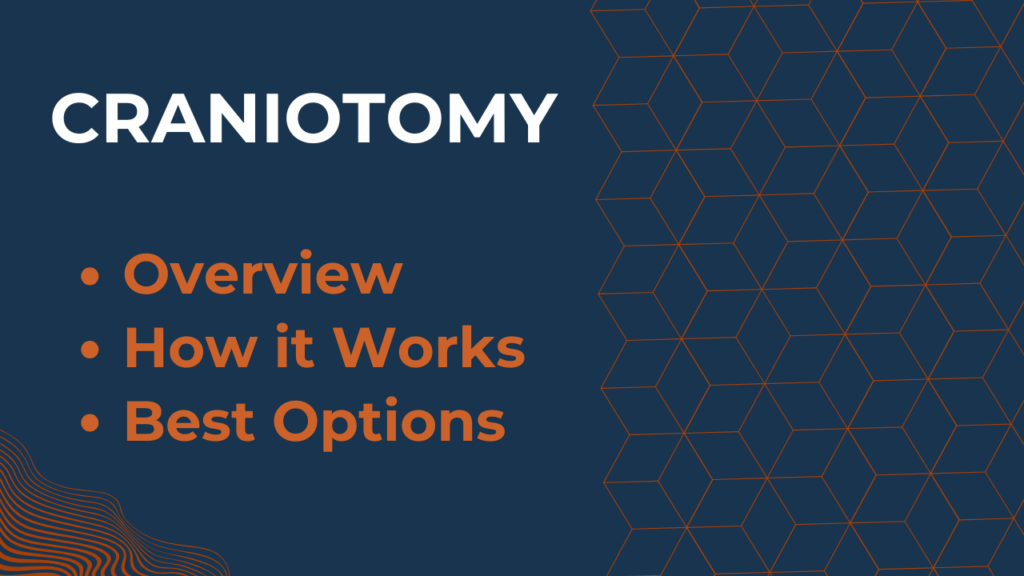Craniotomy
Craniotomy for Brain Surgery | Treatment for Brain Tumor
Craniotomy: A Modern Approach to Neurosurgical Care
A craniotomy is one of the most fundamental and vital procedures in neurosurgery. It is a surgical procedure that involves making a temporary opening in the skull to expose the brain. It is not a treatment in itself, but rather the essential access pathway that allows a neurosurgeon to perform life-saving and life-improving procedures deep within the brain, such as the removal of a tumor, the clipping of an aneurysm, or the drainage of a hematoma.
In Pune, India, Dr. Jaydev Panchwagh is highly experienced in performing craniotomies for a wide range of complex neurological conditions. His mastery of this procedure, combined with the use of advanced technology, ensures the safest possible access to the brain while minimizing risks to the patient.

What is a Craniotomy?
A craniotomy is the surgical creation of a bone flap (a piece of bone) from the skull to gain access to the brain. Once the surgical procedure on the brain is complete, the bone flap is typically replaced and secured to the skull using small plates and screws.
Craniotomies can be performed in different locations and sizes depending on the part of the brain that needs to be accessed. The location of the craniotomy is meticulously planned to provide the most direct and safest route to the target area while minimizing the impact on surrounding structures. The term is often used interchangeably with the larger surgical procedure it facilitates, such as a “tumor resection via craniotomy.”
How Does It Work?
A craniotomy is a precise procedure performed under general anesthesia. It is the first step of many complex brain surgeries.
- Surgical Planning: Before the procedure, Dr. Panchwagh uses sophisticated imaging (like MRI or CT scans) to precisely map the location of the target area in the brain. This is a critical step to ensure the craniotomy is positioned in the most optimal and least invasive location.
- Incision and Bone Flap: An incision is made in the scalp, often behind the hairline to reduce visibility. A special drill is then used to cut a small bone flap from the skull. The bone flap is carefully removed and set aside.
- Dural Opening: The dura, the tough membrane covering the brain, is opened to expose the brain tissue.
- The Main Procedure: At this point, the neurosurgeon, using specialized tools, can perform the primary surgery, such as:
- Tumor Resection: Removing a brain tumor.
- Aneurysm Clipping: Securing a bulging blood vessel.
- Hematoma Evacuation: Draining a blood clot.
- Closure: After the main procedure is complete, the dura is closed, the bone flap is replaced and secured with small screws, and the scalp incision is stitched or stapled. The bone flap heals over time, fusing with the surrounding skull bone.
Why Choose Dr. Jaydev Panchwagh for a Craniotomy?
A craniotomy is a foundational neurosurgical skill, and its success relies on the surgeon’s experience and precision. Dr. Jaydev Panchwagh in Pune, India, is a highly trusted choice for a craniotomy because of his:
- Extensive Experience: With over two decades in neurosurgery, he has performed countless craniotomies for a wide range of conditions, mastering the technique for optimal access and minimal risk.
- Mastery of Advanced Techniques: He is a master of microsurgical techniques and utilizes cutting-edge tools like Neuro-navigation to plan the craniotomy and guide the entire procedure with unparalleled accuracy. He also performs Awake Craniotomies for tumors in critical brain areas, a testament to his advanced skill.
- Patient Safety Focus: Dr. Panchwagh and his team prioritize minimizing risks and maximizing the patient’s recovery, from meticulous pre-operative planning to careful post-operative care.
- Surgical Efficiency: His expertise in performing the craniotomy and the subsequent procedure efficiently can lead to shorter surgical times, reduced blood loss, and a quicker recovery for the patient.
Frequently Asked Questions (FAQs) about Craniotomy
Dr. Panchwagh and his team take great care to make the incision as discreet as possible, often placing it behind the hairline to minimize the cosmetic impact.
The length of the procedure depends entirely on the condition being treated. While the craniotomy itself is a relatively quick step, the subsequent surgical procedure can take several hours.
Yes, in most cases, the bone flap is replaced and secured with plates and screws, and it will heal and fuse back with the rest of the skull. This is called a craniotomy. If the bone flap is not replaced, it is called a craniectomy, which is less common.
The recovery from a craniotomy itself is typically a few weeks. However, the overall recovery time is determined by the underlying condition and the procedure that was performed. Patients are monitored in the hospital for a few days to a week.
A craniotomy is the first step in many complex neurosurgical procedures. Trusting this crucial step to a highly experienced and skilled neurosurgeon like Dr. Jaydev Panchwagh is paramount to a successful outcome.

A distinguished Brain and Spine Surgeon, shaping neurosurgical care in Pune, Maharashtra, India for over two decades.
Quick Link

Quick Contacts
- Phone : (+91) 9011333841 , (+91) 7720948948
- brainspine66@gmail.com
- 102, Bhagyatara Society, 1st floor, Mehendale Garage road, Erandwane, Pune
Map
- Copyright @2025 | Dr. Jaydev Panchwagh | Praavi Medicare
